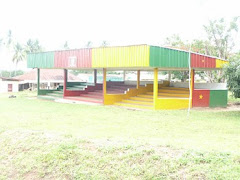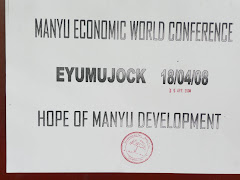
In 1973, a courtly healthy baby named Bate Nico became the 4th child of a blissful mother – Mami Pauline Bate (late) in Kembong, a village of 25,000 inhabitants, separated by a dusty 12 mile earth road from Mamfe town. By the age of six, the young Bate moved to Nguti to live with his aunt and attend primary school. He enrolled in Catholic school Nguti in 1979 and later returned to Kembong where he completed his primary education in 1985 after the aunt fell ill.
Like most young kids aspiring to enter secondary school, the young Nico’s parents could not afford to further his education. Ma Pauline Bate had just returned from a major surgery and depleted her little savings in medical bills. One evening, she called her young son and explained why he could not go to college but opted for him to learn a trade. After two years at home, and upon full recovery, Ma Pauline Bate sent her son to Mutengene to pursue a course in draftsmanship.
Nico set foot in Mutengene in 1987, and completed the program in building draftsmanship. He will then move on to open a business drawing plans and seeking building contracts. The business slowly developed, and a few apprentices were recruited who later became members of his musical troupe.
For Bate Nico, music is a genetic endowment, passing on from one generation to another within the family. One of his aunts was a famous singer who was widely revered and adored in the village with a voice befitting an angel. Legend holds that she was bewitched and lost her voice until her death. Based on historical accounts and testimony, Bate’s grandfather was also a custodian, storyteller and composer of Ekpe music. Upon his death one of the biggest Ekpe festivals in Manyu took place in Kembong due to his popularity. After grandfather died, Nico’s father kept up the pace, promoting the family’s musical legacy and became a founder of the famous Ngoh Njoh dance group in Kembong.
Since music was naturally in the family genre, Bate went on to start composing songs – mostly reggae, merenge, makossa etc. He played every instrument he could lay his hands on. His first break through came when the late McKnight Makoge invited him to CRTV Buea for a reggae program. His music clip hit the airwaves and fans started looking around for him including Regina Nkongho. When they finally met, Regina who was already a composer suggested they form a group to revive the Manyu culture. At first, Bate was hesitant believing music in the Manyu dialect will not have a wide appeal and be marketable like makossa or reggae.
In the early part of 1992, Bate Nico, Nkongho Regina, Ayuk Ashu, Taku Raphel, Epey Moses. Eta Unique and the late pa John Akem formed a group known as Ache Ejagham system. Later on, one of the members (Eta Unique) dropped out to continue on his own. The group went on to record its first album in September 1992 named “na money di find money”. The track was arranged by Jacob Nguni in Kumba with Bate Nico and Nkongho Regina as lead vocals. After collecting the master tape from Jacob, it was time to have it produced. In those days, most music in Cameroon was produced either in France or Nigeria, due to lack of recording studios. As a hungry lion in search of food, the group went around seeking for funds but to no avail until Ma Pauline Bate came to their rescue. With directions from Jacob Nguni, Bate and his group were advised to contact the famous late Nico Mbaraga in Nigeria for assistance with recording. After meeting prince Nico, he employed some of his workers to lead Bate and his team to Rogers all stars recording studio. Things did not work out as envisioned; Nico Mbaraga’s boys somehow led Bate and his group to the wrong studio where their master tape was destroyed. They later returned to Cameroon disillusioned, disappointed, broke and discouraged.
With disappointing results from the Nigerian trip, Ache Ejagham system disbanded. Nico and Regina decided to move on as couple, got married and began working and horning their musical skills. Since 1992, the couple has gone on to produce 8 albums and over 30 singles.
According to Bate Nico, music is something born in him. He considers music an appropriate medium to send messages far across and a way to sensitize people on day to day issues. To come up with lyrics, Nico often ponders about events that happen to people in society. He simply develops a story line, title and horns the instrumentals to perfection. Sometimes, he develops his thought process during sleep and gets up to pen down his ideas in paper. As a writer, composer, singer and instrumentalist, Nico possesses different skill sets in the music arena. He is directly involved in his music production, playing instruments, taking part in studio arrangement and recording.
As earlier depicted in his biography, Bate Nico is a likeable personality with an ever pleasing smile, electrifying dance steps, great vocals and sense of humor. His resourcefulness is a deep pride to Manyu and Cameroon.
Catch a glimpse of Bate Nico, the fervent artist with a silky rhythm as he concludes his musical tour of North America with a major concert billed for Friday August 12, 2011 in Lanham Maryland.



























